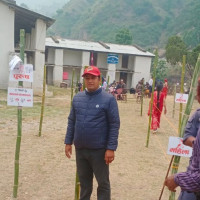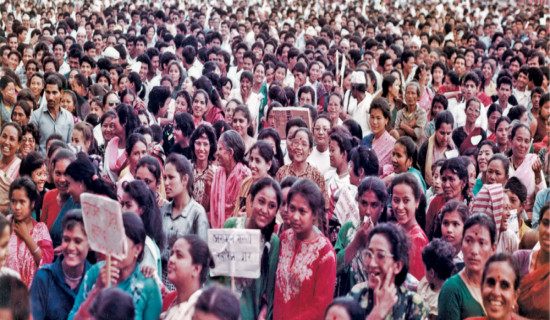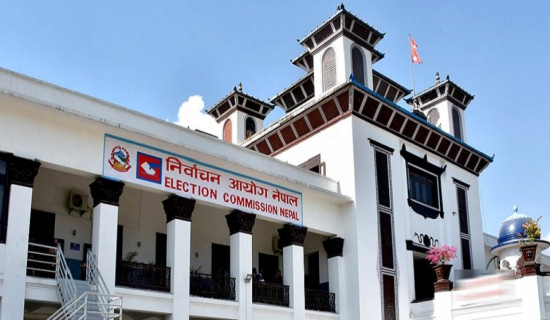- Saturday, 27 April 2024
Urgent anti-dengue measures urged
Kathmandu, Aug. 3: A sharp rise in dengue cases across the country, especially in Sunsari and Dhading districts, has led to widespread panic among the people in the districts, which had a major outbreak last year.
The escalating number of infections has become a pressing national health concern, with daily illnesses and fatalities prompting health experts to call for urgent preventive measures.
As of July 30, dengue has already spread throughout 70 districts of the country, resulting in at least eight fatalities and infecting 5,688 people.
Last year, Nepal witnessed a large dengue outbreak with the highest number of cases reported in the Kathmandu Valley, where 88 people lost their lives and 54,784 were infected.
While Kathmandu has not seen a massive outbreak this year, Dr. Sher Bahadur Pun, a virologist at Sukraraj Tropical and Infectious Disease Hospital, warns of a potential risk of another outbreak due to a failure to learn from past experience and implement preventive measures. The Department of Health Services Epidemiology and Disease Control Division has listed Kathmandu as one of the top 10 districts reporting dengue fever cases.
Residents of Kathmandu who contracted dengue fever last year, including those hospitalised, now fear the potential consequences of reinfection. Last year, a majority of families in Kathmandu had multiple members affected by dengue. The valley also had a major dengue outbreak in 2019.
Health experts have warned that reinfection of dengue can cause serious illness, often requiring intensive care and may prove fatal if not diagnosed and treated promptly.
Ashmita Poudel, a 39-year-old resident of Baneshwor, who experienced dengue last October, fears reinfection and its impact on her and her husband's health.
According to her, when she contracted dengue, she experienced symptoms such as fever, severe headache, muscle pain, nausea, rashes, a certain reduction in platelet counts and elevated counts of liver enzymes.
“But my husband's infection took a severe turn after his blood platelet levels extremely dropped, leading to bleeding from his nose and gums. He had to be hospitalised for five days and received platelet transfusions,” she said.
Although he recovered from the severe symptoms, Poudel mentioned that there are lingering post-dengue effects on his health. He continues to experience hair fall, weakness, and fatigue.
Having experienced both dengue and COVID-19, Poudel remarked dengue a much worse and expressed her worry about the potential consequences if they were to get reinfected with the disease.
Likewise, Sumitra Thapa, a 29-year-old pregnant woman from Sinamangal, and Pradeep Kayastha, a 45-year-old man from Gaurighat, also have similar worries to share. Thapa, 26 weeks pregnant with twins, worries about the risks to herself and her babies if she experiences a recurrence of dengue.
According to her, she contracted the virus during the last Dashain festival and went through a harrowing experience with severe dengue fever symptoms.
Similarly, Kayastha who was hospitalised in September last year due to severe dengue-associated symptoms, like bleeding gums and elevated sugar level, has reported ongoing health issues.
He mentioned experiencing brain fog, hair loss, and feeling out of breath while walking upstairs, indicating that the effects of dengue are still impacting his health months after the initial infection.
Kayastha said he is worried how his body would react to a potential recurrence of dengue fever within a 12-month period; especially given that his first experience with the disease was already highly severe and his post-dengue symptoms.
Virologist Dr. Pun also suggested that the risks posed by repeat dengue fever infections are much greater than those posed by the initial illness.
“There are a total of four serotypes of dengue fever virus (DENV-1, DENV-2, DENV-3 and DENV-4). The body is only able to build immunity to the strain it has previously been exposed to. That means that one person is capable of contracting all four strains of the virus throughout their life,” he added.
He said that the recurrence of dengue infection with a separate strain of the dengue virus can have serious clinical consequences and can be fatal if not treated promptly.
However, Umesh Mehta, the Public Health Officer of the Health Division, Dharan, stated that there is no evidence to suggest that the eight individuals, who died from dengue in Dharan Sub-Metropolitan City, had experienced reinfection of the disease.
Age factor and chronic diseases are associated with dengue fatality in the city, he added. According to Mehta, there have been a total of 2,495 reported cases of dengue fever up to this point, and currently, 12 individuals are receiving incentive care.
Likewise, Dr. Pun further said pregnant women should be considered an at-risk population for dengue management programmes, as the dengue infection in them may be associated with adverse outcomes such as maternal mortality and stillbirth.
While Kathmandu has seen a lower infection rate compared to Dharan Sub-Metropolitan City, it is crucial to implement timely preventive measures by learning from past experiences.
Dr. Pun said dengue poses a significant public health crisis that can only be prevented through collaborative efforts between the government and communities.
Urging the government to initiate the search-and-destroy larvae campaign immediately, he said while individual precautions are essential, effective control requires a united approach.
















